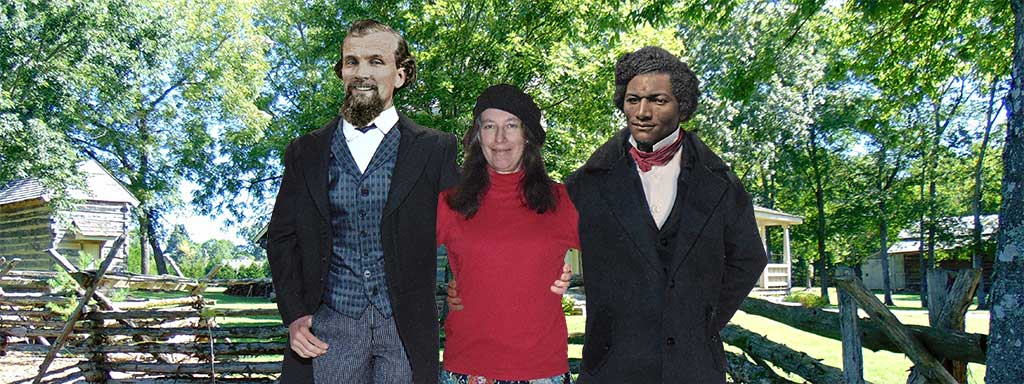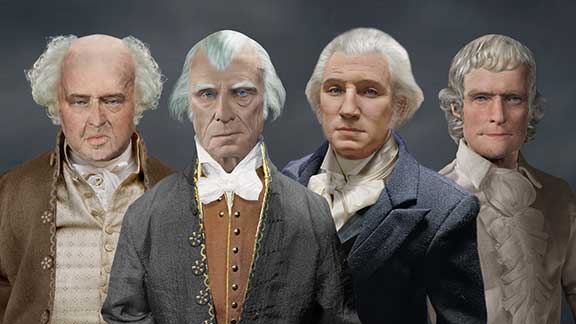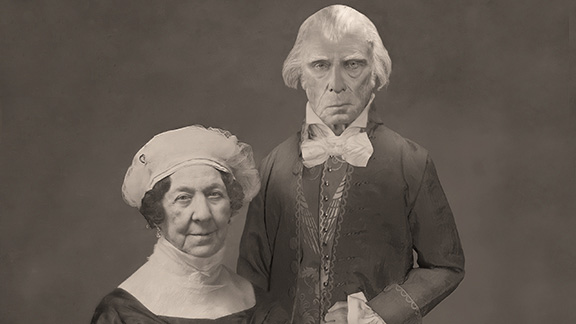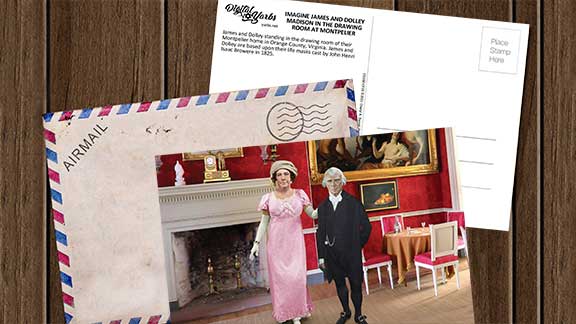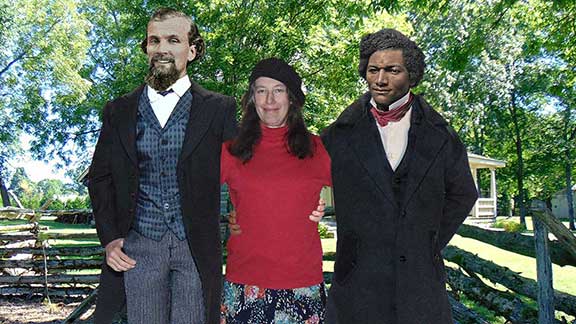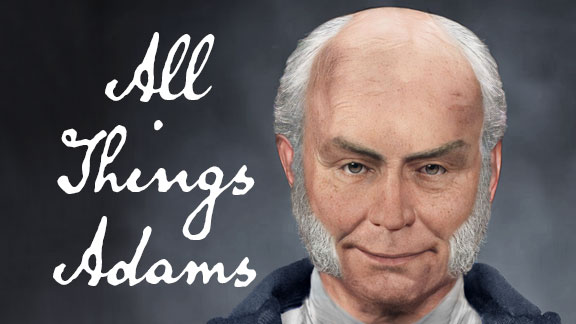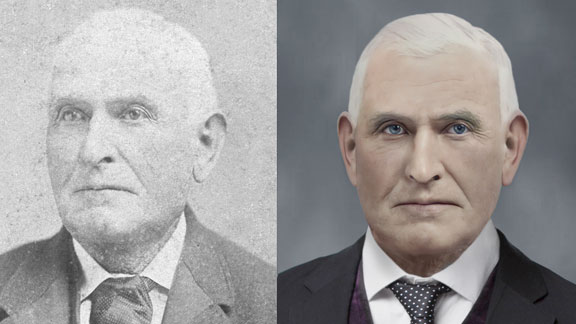Home >> Intimate History Tours >>An Intimate Tour with Nathan Bedford Forrest and Frederick Douglass
Slaying the Racism Demon with Nathan Bedford Forrest and Frederick Douglass
A Lesson learned from yesterday…….
Introduction
After becoming a Christian some years ago, I wanted to meet famous people in history who appeared to have a genuine conversion to Christ. I remember the former slave and abolitionist Frederick Douglass once saying,…” between the Christianity of this land, and the Christianity of Christ, I recognize the widest possible difference.”1
What did he mean by this?
Come back in time with me to find out.
A little background
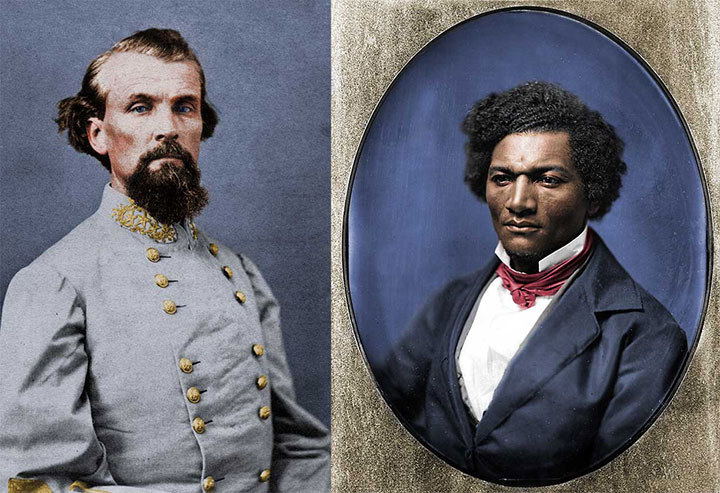
Left: Confederate General Nathan Bedford Forrest (1821-1877) Right: Frederick Douglass (1818-1895) Colorized by: Cheryl Daniel
“Nathaniel Bedford Forrest was a Confederate general during the American Civil War. Perhaps the most highly regarded cavalry officer and guerrilla leader in the war. Forrest is regarded by many military historians as that conflict’s most innovative and successful general. Forrest is also one of the war’s most controversial figures. Although he was accused of war crimes at the Battle of Fort Pillow for having led Confederate soldiers in an alleged massacre of unarmed black Union troops, the accusation was later rejected by an 1871 Congressional investigation. After the war he was alleged to have participated in the founding of the Ku Klux Klan. Forrest was a successful businessman, an owner of several plantations and a slave trader.”2 Forrest was called the “Wizard of the Saddle” and “That Devil Forrest.”
“Frederick Douglass, was an American abolitionist, newspaper publisher, orator, author, statesman, and reformer. Called “The Sage of Anacostia” and “The Lion of Anacostia,” Douglass was among the most prominent African-Americans of his time, and one of the most influential lecturers and authors in American history.”3
Note: Actual words of Nathan Beford Forrest and Frederick Douglass are in blue. Inferred conversation is consistent with the historical record.
A Time Travel Adventure
A little bird told me4 that Confederate General Nathan Bedford Forrest had become a Christian later in life. After visiting with James and Dolley Madison and then flying to Metropolis with Superman, we hopped in our time machine and continued our adventure through time to visit this Civil War era personage to find out if this were true.
I sent a letter to Mr. Forrest stating that we would like to meet him. Being that we were traveling through Tennessee at that time, he agreed to meet us at his boyhood home in Chapel Hill, Tennessee.
The year is 1876 and things have really changed since our visit with James Madison. We ride up to the former home of the general. While he no longer owns this home, he wanted to meet us there.
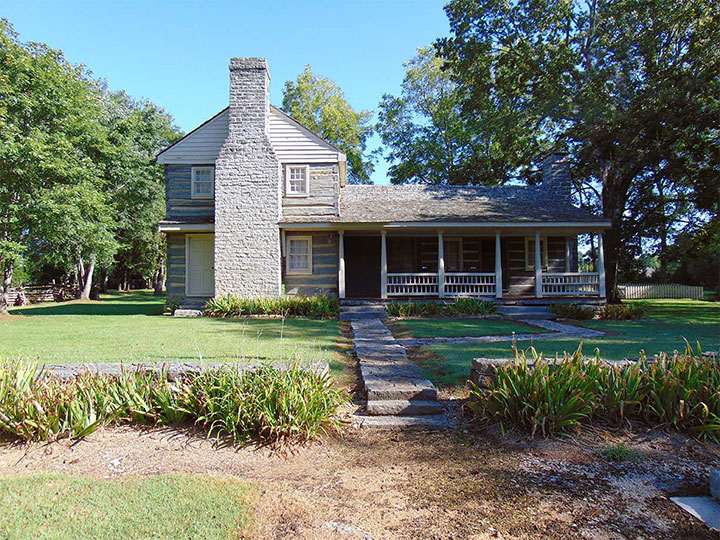
Boyhood home of Nathan Bedford Forrest
As we walked up to the cozy looking little cabin. I grabbed my camera. I had to get photos of this. Nathan Bedford Forrest House
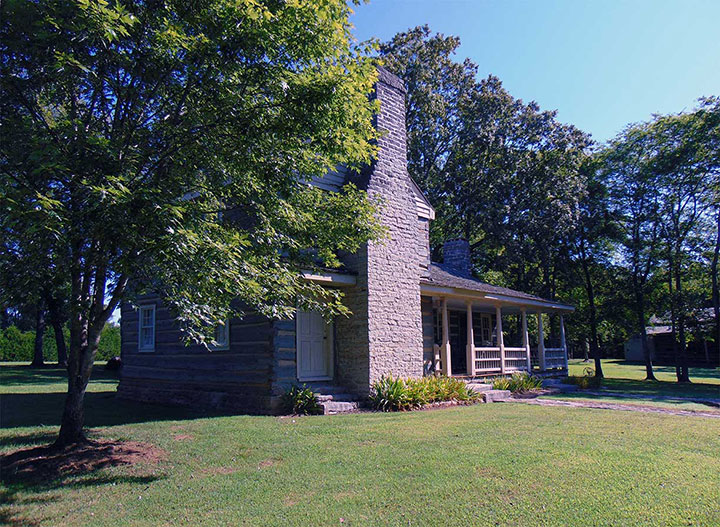
Boyhood home of Nathan Bedford Forrest
We didn’t see Mr. Forrest at first so we decided to have a look around. Mr. Forrest soon emerged from the rear of the house.
At six feet two inches, he was a pretty tall fellow. Just as Union Capt. Captain Lewis Hosea once noted, Forrest had a “striking and commanding presence.”5 He smiled as he extended his hand to greet us. He was pleasantly surprised to meet us, saying that this was his first time meeting someone from the 21st century.
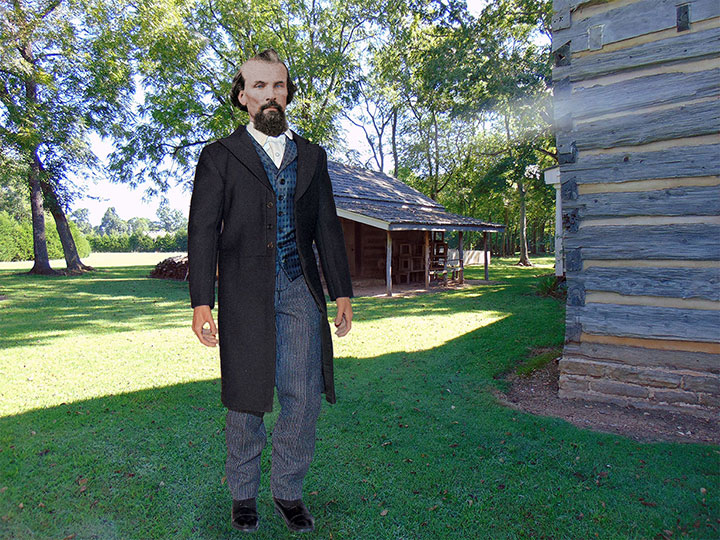
Nathan Bedford Forrest at his boyhood home.
We told Mr. Forrest that we had been anxious to meet him. I also told Mr. Forrest that I had also contacted another famous personage from his era, Mr. Frederick Douglass. Mr. Douglass, who was also traveling, had agreed to meet with us. I told Mr. Forrest that there was a particular reason that I wanted to meet both himself and Mr. Douglass together at the same time. I wanted them to share how a supernatural event had drastically changed their lives. I informed him Mr. Douglass was staying at a local inn, and I asked Mr. Forrest if he could meet with us before we left. Mr. Forrest happily agreed to the meeting.
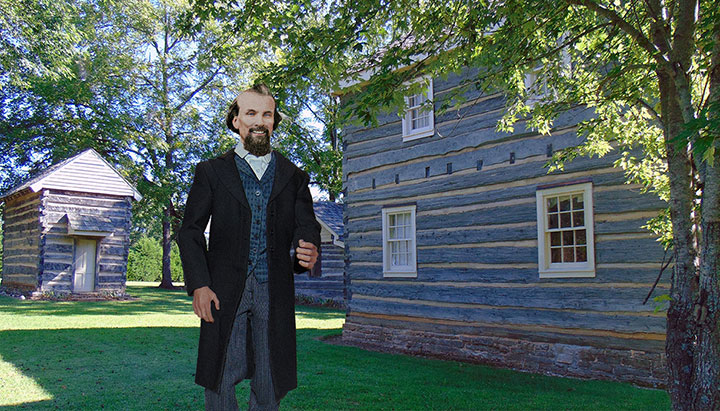
Nathan Bedford Forrest greets us at his boyhood home.
In the meantime we asked Mr. Forrest to show us around his boyhood home. We entered into the front right downstairs entrance to the kitchen-dining area. This was so exciting meeting a Civil War personage. I just had to get a photo. Mr. Forrest and I sat for this snapshot.Mr. Forrest was quite surprised at how fast the photo was taken. I told him that we didn’t have to sit and wait minutes to have our picture taken with 21st century cameras like they did with the cameras of his time.
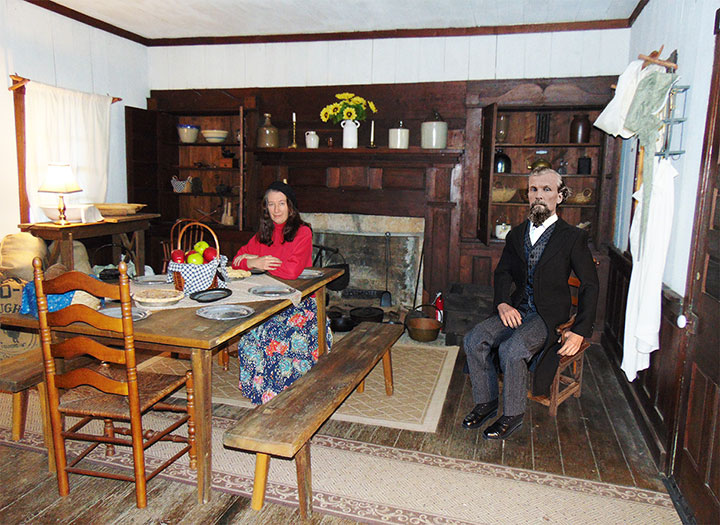
Sitting with Nathan Bedford Forrest in the kitchen.
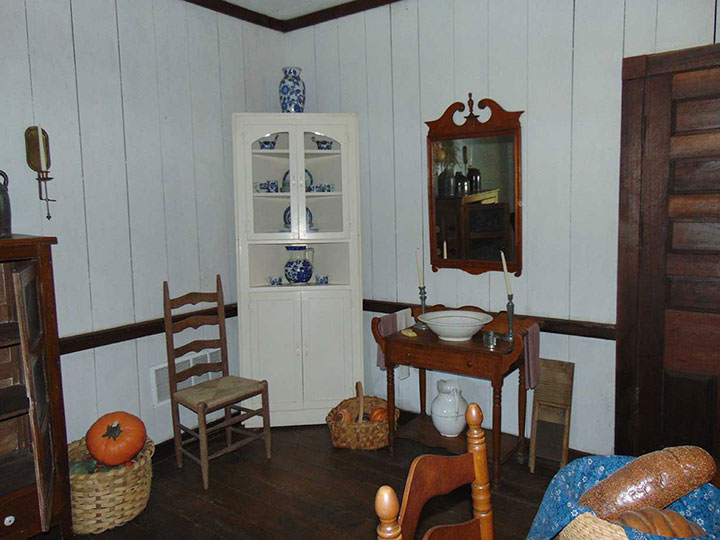
Nathan Bedford Forrest’s boyhood home kitchen.
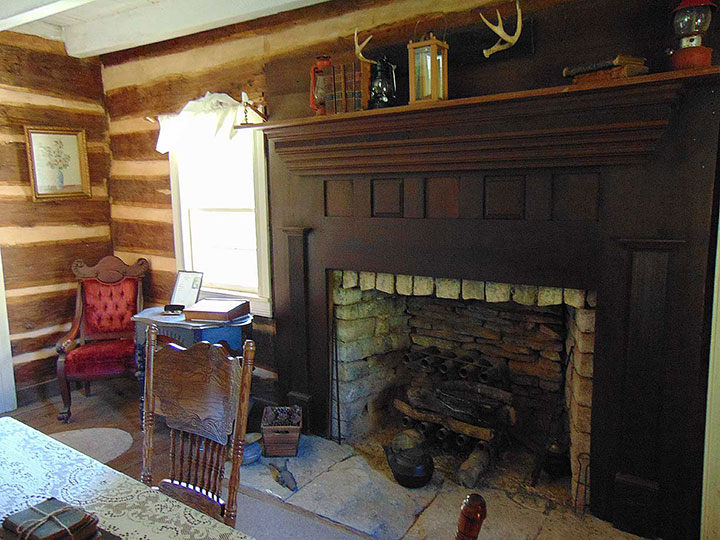
Downstairs room of Nathan Bedford Forrest’s boyhood home.
We continued the tour of the home, with another photo of the kitchen. I enjoyed seeing the simple but hard life folk lived in the 1870’s. Mr. Forrest showed us the doorway to the upstairs bedroom. Once upstairs, I got another cool side profile snapshot of the former general.
“You really like taking a lot of photographs, don’t you?” he asked.
“Yes, I do General. Have camera, will travel!”
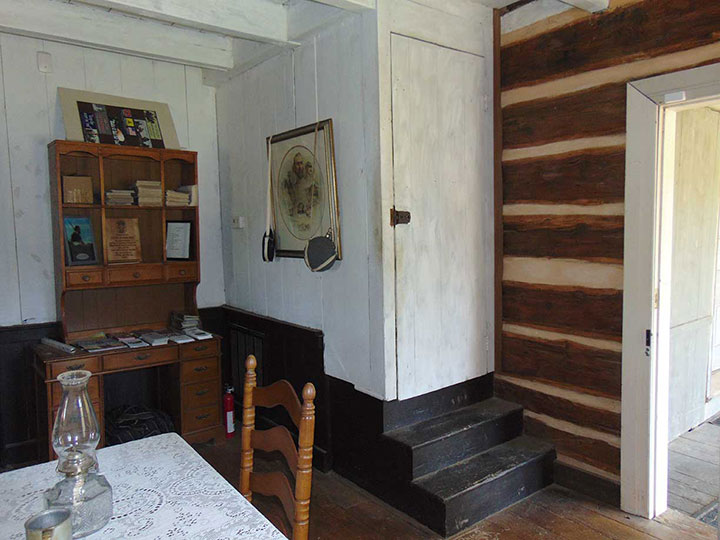
The stairway of Nathan Bedford Forrest’s boyhood home.
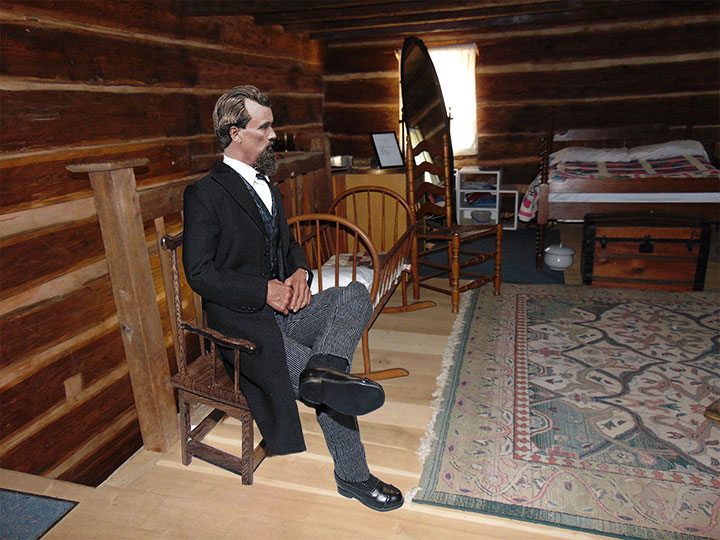
Nathan Bedford Forrest sitting in the upstairs bedroom of his boyhood home.
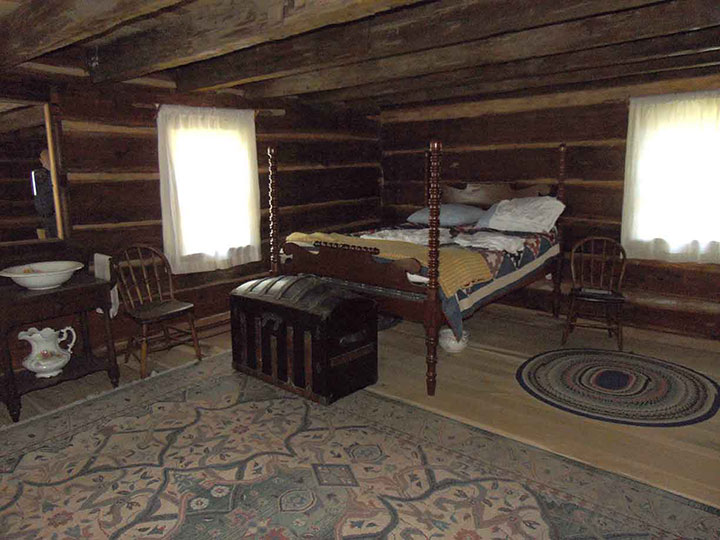
Upstairs bedroom of Nathan Bedford Forrest’s Boyhood Home.
I took a few more shots of the upstairs bedroom.
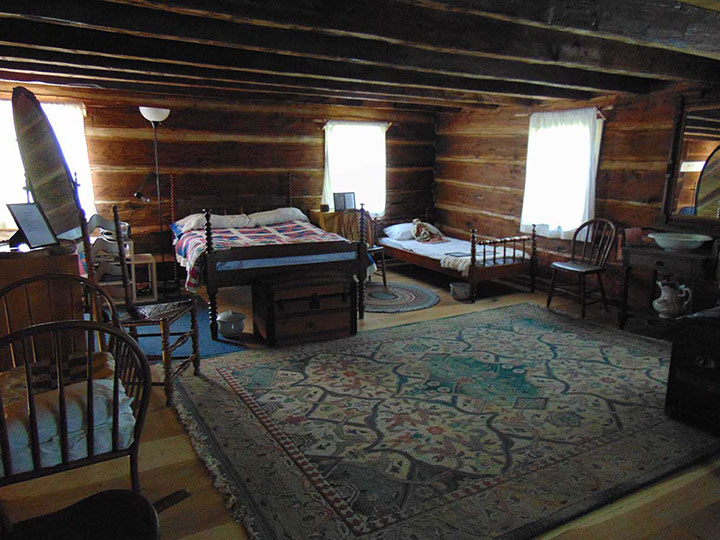
Upstairs bedroom of Nathan Bedford Forrest’s Boyhood Home.
The next day, Mr. Forrest and I traveled to meet Frederick Douglass. I wanted to understand how both men, one a former slave trader and one a slave overcame the racism that was so prevalent in their day.
We all met at a local inn. Both men agreed to share their stories with me. We all sat in the room and got to know each other a little better. I asked the general if he would share his story first.
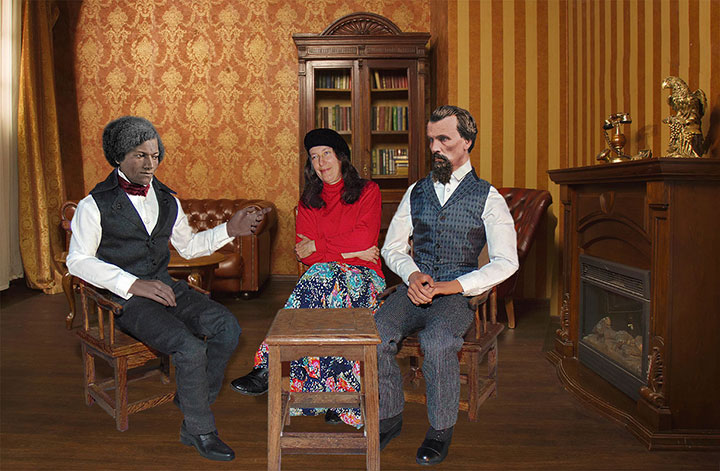
Cheryl Daniel listening to the testimonies of Frederick Douglass and Nathan Bedford Forrest.
Forrest said, “It wasn’t until I had a supernatural heart change that I was able to view all of my fellow Americans as equals. Some would say that I got “religion,” but it is much deeper than that.”
“I’d always shown reverence to religion but always considered Christianity as a woman’s religion. It was more of a superstition to me than a real relationship with Christ. During the war, many of my fellow soldiers had pressed me to become a Christian. I told them I did not have time to become a Christian during the war, but I might consider it afterwards.”6
“Deep down, I knew I was not living a righteous life. When the war was ending, I wrote to my son William to tell him to care for his mother and avoid the sinful and wicked ways of his father.”7
“There was one instance when I asked for prayer. During the war, when Fort Donnelson was falling to the U.S. Army, I called Major D. C. Kelley to my side and implored him, “Parson! For Gods’ sake pray! Nothing but God Almighty can save that fort!“”8
“I must confess at that time that I only wanted God’s influence when it benefited me, yet I refused to relinquish ultimate control of my life to the Lord. I only wanted the rewards of Christianity without making any spiritual commitments of my own.”9
“Many years later, I started attending Court Avenue church with my wife, Mary Ann. She was always a deeply committed follower of Christ. She never gave up on me and prayed for me every day, especially during the war.”10
“Well, I sat under those sermons with her at church, and the words were a little convicting, but I kept resisting. Rev. George Tucker Stainback, the preacher, was a very God-fearing man, who abhorred that which is evil, and obeyed the injunction to cleave to that which is good. Unlike the preacher, I had a reputation in some circles as evil personified. After all, I was known by some as ‘That Devil Forrest.'”11
“The Lord was dealing some hard blows spiritually to break me, but I was a man of strong will, but that didn’t stop Him. The Lord continued to deal with me, especially when I happened to run into Raleigh White, who served as a colonel under me during the war.”
“White reminded me a lot of myself, as our past was very similar. I saw him on the street in Memphis, and I was shocked because I heard that he was living in another country.”12
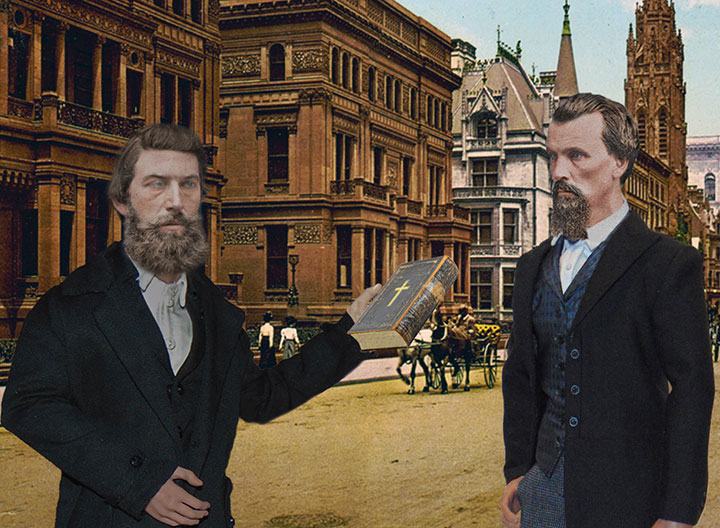
Raleigh White shares the gospel message with Nathan Bedford Forrest in Memphis TN
“I said to him, ‘What have you been up to these days?’
He told me that his wife had led him to Christ after dabbling in the business world. He had surrendered his life to the Christian ministry was now preaching the gospel of the Son of God.”13“I couldn’t believe it. White was just like me in so many ways; he was a fierce warrior during the war, he had no use for Christianity, he had narrowly escaped death on the battlefield, he too had a godly wife praying for him and just like me he failed in business after the war. Now he was living for Jesus and had peace and joy, but I did not. I felt conviction in my heart that was stronger than before; I couldn’t kick against the pricks. I asked Raleigh to pray for me.”14
“He and I walked to a nearby bank lobby and kneeled to pray. I remember many times how I killed men in public, and now here I was kneeling to pray wondering if Christ could forgive me. We prayed, but I still was resisting the Lord.”15
“The final strike to my heart came on November 14, 1875, when I was sitting in church with my wife, again, listening to Rev. Stainback’s sermon.
He preached the words of Jesus from Matthew 7: 24-27 King James Version, Therefore whosoever heareth these sayings of mine, and doeth them, I will liken him unto a wise man, which built his house upon a rock:
25 And the rain descended, and the floods came, and the winds blew, and beat upon that house; and it fell not: for it was founded upon a rock.26 And every one that heareth these sayings of mine, and doeth them not, shall be likened unto a foolish man, which built his house upon the sand:27 And the rain descended, and the floods came, and the winds blew, and beat upon that house; and it fell: and great was the fall of it.“16
“Tears filled my eyes during that sermon. I realized I had accumulated great wealth dealing in slaves before the war. I was a hero of the Confederacy, I had recruited, trained, and led cavalry troops into countless battles, and my victories were impressive and legendary. I personally triumphed over thirty men in battle in hand to hand combat. My life had been devoted to building my prestige, power, and pocketbook. But now I could see clearly that it was a kingdom of sand and would not carry me into eternity. My worldly success would never gain me entrance into the eternal kingdom of heaven.”17
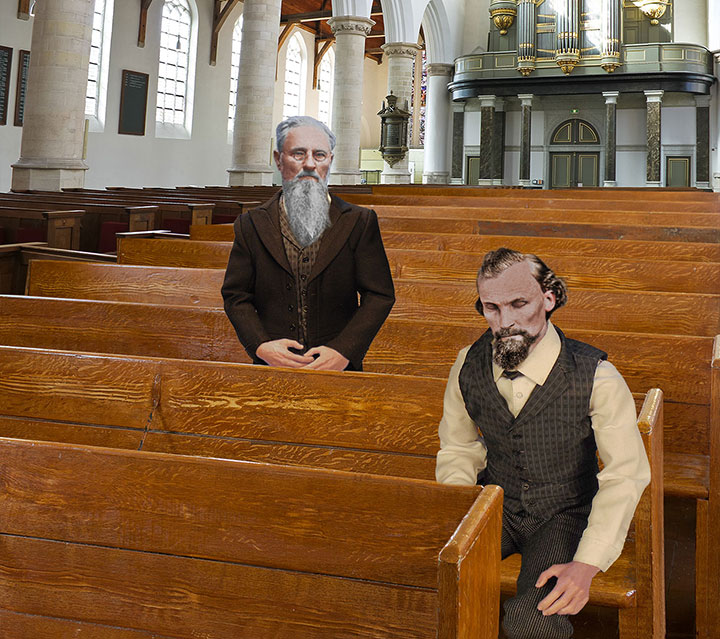
Rev. George Tucker Stainback speaks and prays with Nathan Bedford Forrest.
I was broken with tears, and I told Rev. Stainback, “Sir, your sermon had removed the last prop from under me. I am the fool that built on the sand; I am a poor miserable sinner.”
The next night I prayed with Stainback and met the living Savior. I told Stainback that I was satisfied, and all is right. I have put my trust in my Redeemer.“18
The Lord soon showed me one of the many things I had to do to make things right after my repentance. I had to right the wrongs I did against my fellow brethren when I was a slave trader. Sadly, I couldn’t undo a lot of my sins, but I could make reconciliation where possible. The Lord showed me that I had to love as He loved and follow his second greatest commandment to love my neighbor as myself. The Lord helped me put my racist views behind me and view the black man as my equal. I decided to publicly speak out on their behalf. I knew I would be ridiculed by white society for doing so, but the Lord showed me that I must deny myself if I were to follow Him. I was reluctant, but just as I had great strength to stand against a physical enemy during the war, I was able through Christ to stand against the spiritual enemy of my soul.
July 5, 1875, I was invited to be the honored guest speaker at the Independent Order of Pole-Bearers Association, a civil rights group made up of black people in the Memphis area. A young black lady, Lou Lewis who was the daughter of the Pole Bearers’ officer presented me with a bouquet of flowers before I spoke.19,20”
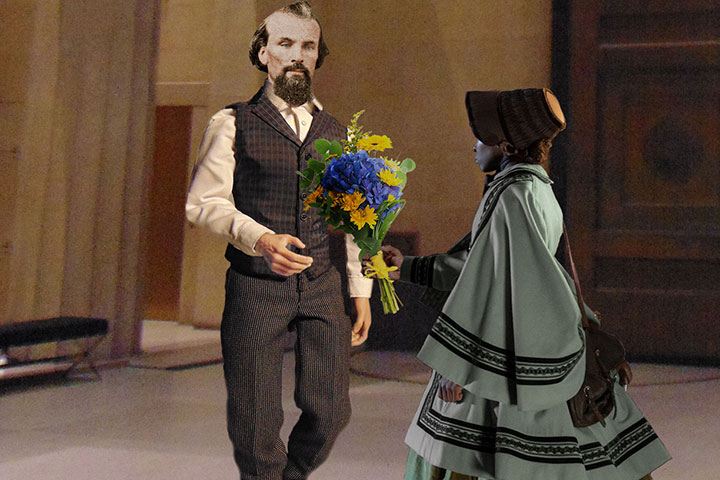
Lou Lewis presents flowers to Nathan Bedford Forrest.
“I stood before them and said, ‘Ladies and Gentlemen I accept the flowers as a memento of reconciliation between the white and colored races of the southern states. I accept it more particularly as it comes from a colored lady, for if there is any one on God’s earth who loves the ladies I believe it is myself.’ (Immense applause and laughter.)
‘I came here with the jeers of some white people, who think that I am doing wrong. I believe I can exert some influence, and do much to assist the people in strengthening fraternal relations, and shall do all in my power to elevate every man to depress none.’ (Applause.)
‘I want to elevate you to take positions in law offices, in stores, on farms, and wherever you are capable of going. I have not said anything about politics today. I don’t propose to say anything about politics.’
‘You have a right to elect whom you please; vote for the man you think best, and I think, when that is done, you and I are freemen. Do as you consider right and honest in electing men for office.
’‘I did not come here to make you a long speech, although invited to do so by you. I am not much of a speaker, and my business prevented me from preparing myself. I came to meet you as friends, and welcome you to the white people.’
I want you to come nearer to us. When I can serve you I will do so. We have but one flag, one country; let us stand together. We may differ in color, but not in sentiment.’
‘Many things have been said about me which are wrong, and which white and black persons here, who stood by me through the war, can contradict.’
‘Go to work, be industrious, live honestly and act truly, and when you are oppressed I’ll come to your relief. I thank you, ladies and gentlemen, for this opportunity you have afforded me to be with you, and to assure you that I am with you in heart and in hand.'” (Prolonged applause.)21
“After my speech I leaned down and kissed the colored girl on the cheek who had given me the flowers22, something I would have never done had Christ not changed my heart. The Lord helped me to see that I could love as He loved. There was no hatred in my heart for anyone any longer. Black and white men were now my brothers.”
“For my speaking of encouragement of black advancement and of endeavoring for now being a proponent for espousing peace and harmony between black and white Americans. I was ridiculed by the Cavalry Survivors Association of Augusta. Captain F. Edgeworth Eve gave a speech expressing strong disapproval of my remarks promoting inter-ethnic harmony, ridiculing my faculties and judgment and berating the woman, Lou Lewis, who gave me flowers as ‘a mulatto wench'”.23
“The Macon Weekly Telegraph newspaper also condemned me for my speech, describing the event as ‘the recent disgusting exhibition of himself at the negro [sic] jamboree'”23
“The Charlotte Observer also condemned me when they stated ‘We have infinitely more respect for Longstreet, who fraternizes with negro men on public occasions, with the pay for the treason to his race in his pocket, than with Forrest……..who equalize with the negro women, with only ‘futures’ in payment.'” 23
After hearing Mr. Forrest’s testimony, I was truly impressed by the General’s change of heart and how his new fruits bore out a repentant heart.
Matthew 7:20 KJV Wherefore by their fruits ye shall know them.
Mr. Frederick Douglass then shared his story of how this same Jesus changed his heart as well.
“Previous to my contemplation of the anti-slavery movement, and its probable results, my mind had been seriously awakened to the subject of religion. I was not more than thirteen years old, when I felt the need of God, as a father and protector. My religious nature was awakened by the preaching of a white Methodist minister, named Hanson. He thought that all men, great and small, bond and free, were sinners in the sight of God; that they were, by nature, rebels against His government; and that they must repent of their sins, and be reconciled to God, through Christ. I cannot say that I had a very distinct notion of what was required of me; but one thing I knew very well—I was wretched, and had no means of making myself otherwise. Moreover, I knew that I could pray for light. I consulted a good colored man, named Charles Johnson; and, in tones of holy affection, he told me to pray, and what to pray for. I was, for weeks, a poor, brokenhearted mourner, traveling through the darkness and misery of doubts and fears. I finally found that change of heart which comes by “casting all one’s care” upon God, and by having faith in Jesus Christ, as the Redeemer, Friend, and Savior of those who diligently seek Him.”24
“After this, I saw the world in a new light. I seemed to live in a new world, surrounded by new objects, and to be animated by new hopes and desires. I loved all mankind—slaveholders not excepted; though I abhorred slavery more than ever. My great concern was, now, to have the world converted. The desire for knowledge increased, and especially did I want a thorough acquaintance with the contents of the bible.”25
“I became acquainted with a good old colored man, named Lawson. A more devout man than he, I never saw. …. This man not only prayed three times a day, but he prayed as he walked through the streets, at his work—on his dray everywhere. His life was a life of prayer, and his words (when he spoke to his friends,) were about a better world. “26 “The good old man had told me, that the ‘Lord had a great work for me to do;” and I must prepare to do it; and that he had been shown that I must preach the gospel. His words made a deep impression on my mind, and I verily felt that some such work was before me, though I could not see how I should ever engage in its performance. ‘The good Lord,’ he said, ‘would bring it to pass in his own good time,’ and that I must go on reading and studying the scriptures. The advice and the suggestions of Uncle Lawson, were not without their influence upon my character and destiny. He threw my thoughts into a channel from which they have never entirely diverged. He fanned my already intense love of knowledge into a flame, by assuring me that I was to be a useful man in the world. When I would say to him, ‘How can these things be and what can I do?’” his simple reply was, ‘Trust in the Lord.’ When I told him that ‘I was a slave, and a slave FOR LIFE,’ he said, “the Lord can make you free, my dear. All things are possible with him, only have faith in God.’ ‘Ask, and it shall be given.’ ‘If you want liberty,’ said the good old man, ‘ask the Lord for it, in faith, AND HE WILL GIVE IT TO YOU.'”27 “Thus assured, and cheered on, under the inspiration of hope, I worked and prayed with a light heart, believing that my life was under the guidance of a wisdom higher than my own. With all other blessings sought at the mercy seat, I always prayed that God would, of His great mercy, and in His own good time, deliver me from my bondage.”28
“After being delivered from my bondage and during the years leading to the advent of the Civil War, I learned of Thomas Jefferson’s book, ‘Notes on the State of Virginia,’ published in 1785 in which there is an essay on the subject of “Manners,” which is a personal meditation on the consequences of ill-conduct directed toward those with whom we have daily contact.”29
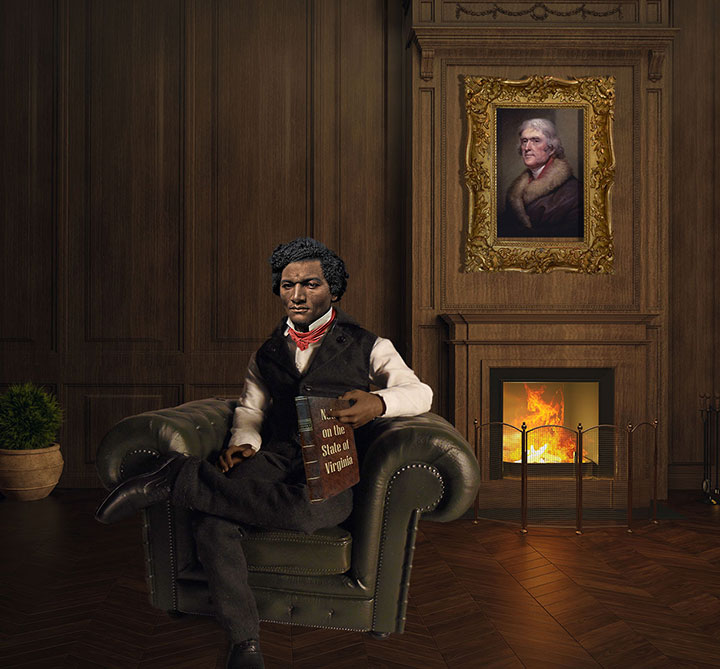
Frederick Douglass with Thomas Jefferson’s Notes on the State of Virginia
“Jefferson said, ‘There must doubtless be an unhappy influence on the manners of our people produced by the existence of slavery among us.’ He continued, ‘The whole commerce between master and slave is a perpetual exercise of the most boisterous passions, the most unremitting despotism on the one part, and degrading submissions on the other. Our children see this and learn to imitate it.'”30
“Perhaps his most powerful observation is to ponder if ‘the liberties of a nation be thought secure when we have removed their only firm basis, a conviction in the minds of the people that these liberties are the gift of God? That they are not to be violated but with his wrath? Indeed, I tremble for my country when I reflect that God is just; that his justice cannot sleep forever.'”31
“By reading “Manners,” I saw Jefferson’s humility instead of his hubris, and it made a lasting impression upon me, so much so that one Sunday, while attending church services at the Metropolitan AME Zion Church, only a few blocks from the White House, I mused, ‘How can I claim to love Jesus Christ and still reserve for myself the right to continue to hate Thomas Jefferson?'”32
“I knew that I could no longer do both. I understood, more so than most, that the essence of Christianity is to ‘forgive those who trespass against us.'”33
Matthew 6:14-16 (KJV) For if ye forgive men their trespasses, your heavenly Father will also forgive you:15 But if ye forgive not men their trespasses, neither will your Father forgive your trespasses.
Douglass continued, “I too, just like the white man, had hate in my heart. Even with all the injustices done to me by my slave masters, Jesus does not allow me to hate. ”
Matthew 6:14-16 (KJV) Ye have heard that it hath been said, Thou shalt love thy neighbour, and hate thine enemy.44 But I say unto you, Love your enemies, bless them that curse you, do good to them that hate you, and pray for them which despitefully use you, and persecute you;/p>
“I also forgave my former slave masters.”
Later in life, I visited my old slave master, Thomas Auld, by then aging and bed-ridden. The man who “had struck down my personality, had subjected me to his will, had made property of my body and soul” was no enemy, Douglass explained: “He was to me no longer a slaveholder either in fact or in spirit, and I regarded him as I did myself, a victim of the circumstances of birth, education, law, and custom.”34
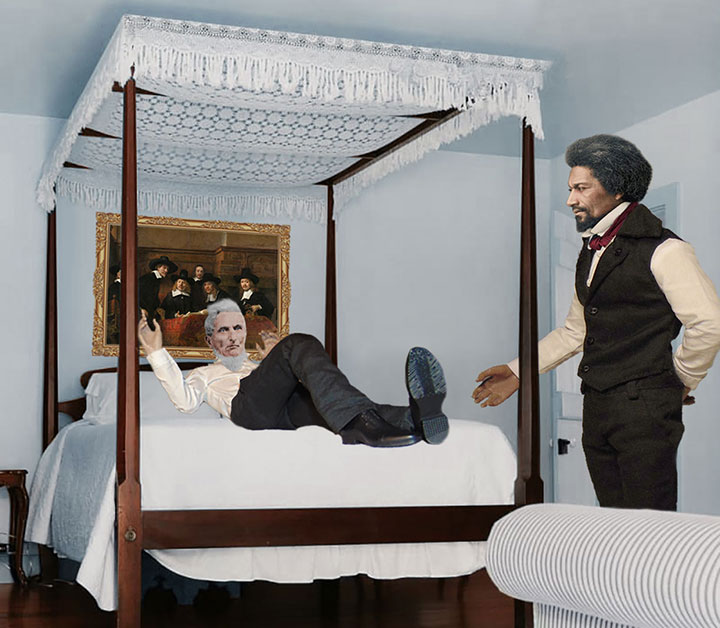
Frederick Douglass meets with his former slave master Thomas Auld.
“When I approached the bed of Thomas Auld, tears came to his eyes. I had not seen Auld for years, and now that we were reunited, we both could not stop crying.35 We shook hands cordially and he, having been long stricken with palsy, shed tears as men thus deeply afflicted will do when excited by any deep emotion. The sight of him … his tremulous hands constantly in motion, and all the circumstances of his condition affected me deeply, and for a time chocked my voice and made me speechless.”36
“I in no way forgot slavery and I in no way forgot evil but I forgave a man who committed evil. The gift of the grace of forgiveness that Jesus gave me affirmed the humanity of even Auld. The spirit of forgiveness is the Spirit of Life.37 I taught my children this as well. Our custom was to read a chapter in the Bible around the table, each reading a verse in turn until the chapter was completed.”38
After Douglass finished his testimony, we all sat around and fellowshipped for a while and had a wonderful time. Before we parted for the evening Douglass and Forrest shook hands as brothers in Christ. Both of them agreed they and all Christians must follow PEACE with ALL men. They were shown this by the same Savior that they both now professed to follow. Both men gave evidence by their actions that their hearts had been supernaturally changed.
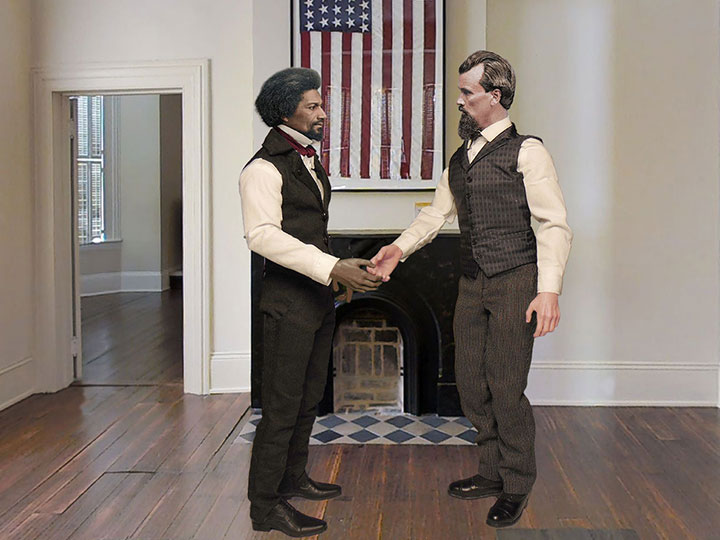
Frederick Douglass and Nathan Bedford Forrest shake hands as brothers in Christ.
I was quite blown away with these two men. Here I witnessed a former slave trader and a former slave who both experienced slavery first hand but were able to forgive and love as Christ commanded.
Douglass was even able to forgive Thomas Jefferson, a founding father of whom he had never met personally. How many today are forfeiting eternal life and happiness with our Savior because they cannot forgive those of the past.
Frederick Douglass, who had firsthand experience of the horrors of slavery, through Jesus Christ was able to forgive those who once oppressed him. Contrast that with many of those who profess Christ today, who have never experienced the horrors of slavery themselves, who cannot find it in their hearts to forgive.
My heart felt pain for the people both black and white of my time, who are forfeiting eternal life as they refuse to relinquish their racist hearts to a loving Savior. Both black and white racists, many who claim to know and follow Jesus and who have never known the horrors of slavery first hand are the ones who refuse to forgive and follow peace with all men. Since the commands of Christ were given to ALL meaning anyone could break them, not just those of one race.
Forget history we must not, dwelling on it and using it as a weapon against each other…. we must stop. Love your neighbor as yourself…follow peace with all men.
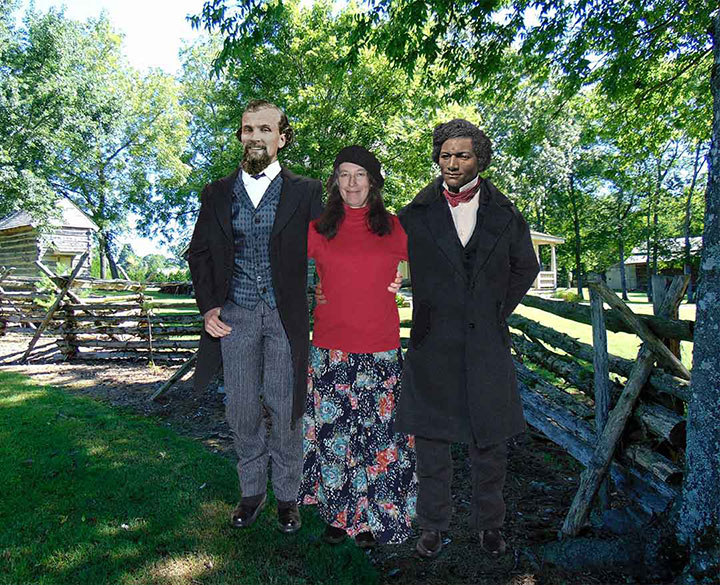
Cheryl Daniel posing with Nathan Bedford Forrest and Frederick Douglass.
The next day, we met back at Forrest’s boyhood home. I had to get one last photo with these men before I went back to the future. I felt a love for them as my brothers, not for what they both once were, wretched sinners, but for what Christ had now made them into…. new creations… 2 Corinthians 5:17 KJV Therefore if any man be in Christ, he is a new creature: old things are passed away; behold, all things are become new.
Conclusion
Sadly, Forrest died a year after we visited him at his boyhood home. Memphis papers reported that his funeral procession was over two miles long. The throng of mourners was estimated to include over 3000 black citizens of Memphis.39
I think both Forrest and Douglas help me to understand what Douglass truly meant when he said, “between the Christianity of this land, and the Christianity of Christ, I recognize the widest possible difference.” All races are capable of racial hatred though they may hide it well with facades of tolerance and religiosity.
So, I have to ask you my fellow brethren:
White man, if you found out for certain that the Lord birthed his only begotten son into the body of a black man, would you still worship him?
Black man, if you found out for certian that the Lord birthed his only begotten son into the body of a white man, would you still worship him?
1 John 20-21 KJV If a man say, I love God, and hateth his brother, he is a liar: for he that loveth not his brother whom he hath seen, how can he love God whom he hath not seen? And this commandment have we from him, That he who loveth God love his brother also.
Hebrews 12:14-29 KJV Follow peace with all men, and holiness, without which no man shall see the Lord:
Jeremiah 17:9-10 KJV The heart is deceitful above all things, and desperately wicked: who can know it?
10 I the Lord search the heart, I try the reins, even to give every man according to his ways, and according to the fruit of his doings.
Matthew 22:37-40 King James Version KJV Jesus said unto him, Thou shalt love the Lord thy God with all thy heart, and with all thy soul, and with all thy mind. This is the first and great commandment. And the second is like unto it, Thou shalt love thy neighbour as thyself. On these two commandments hang all the law and the prophets.
Again, White man, if you found out for certain that the Lord birthed his only begotten son into the body of a black man, would you still worship him? Black man, if you found out for certain that the Lord birthed his only begotten son into the body of a white man, would you still worship him?
1 John 2:9 KJV If anyone claims to be in the light but hates his brother, he is still in the darkness.
Anachronisms: In 1876, Nathan Bedford Forrest’s hair should have been gray. I made his hair darker to give him a more youthful appearance as he is more recognized this way. Frederick Douglass also should appear much older as well.
Special thanks to the Nathan Bedford Forrest Boyhood Home site director, Gene Andrews for giving us a tour and allowing photography of the home and to the Nathan Bedford Forrest Facebook Forum for providing direction in obtaining photos.
Special thanks to Shane Kastler for his book “Nathan Bedford Forrest’s Redemption” ….the inspiration for this page.
Sources & References:
1Frederick Douglass. Life of an American Slave. Boston: Anti-Slavery Office, 1845 http://utc.iath.virginia.edu/abolitn/abaufda14t.html
2Nathan Bedford Forrest. New World Encyclopedia. https://www.newworldencyclopedia.org/entry/Nathan_Bedford_Forrest
3Frederick Douglass. New World Encyclopedia. https://www.newworldencyclopedia.org/entry/Frederick_Douglass
4a little bird told me. Wiktionary. https://en.wiktionary.org/wiki/a_little_bird_told_me
5James Pickett Jones Yankee Blitzkrieg: Wilson’s Raid through Alabama and Georgia. University Press of Kentucky, 2015.
6,7,8,9,10,11,12,13,14,15,16,17,18,20Shane Kastler. “Nathan Bedford Forrest’s Redemption” Pelican Publishing (July,26,2010)
19,21,22,39Greg Tucker. “Remembering Rutherford: Forrest was postwar activist for black civil rights.” Daily News Journal (July 13, 2015) https://www.dnj.com/story/news/2015/07/10/remembering-rutherford-forrest-postwar-activist-black-civil-rights/29995493/
23 Nathan Bedford Forrest. Wikipedia https://en.wikipedia.org/wiki/Nathan_Bedford_Forrest
24,25,26,27,28Frederick Douglass. “My Bondage My Freedom” http://www.gutenberg.org/ebooks/202
29,30,31,32,33Edward C. Smith. “Why Frederick Douglass forgave Thomas Jefferson” Richmond Times Dispatch (Oct 15, 2016) https://www.richmond.com/opinion/columnists/why-frederick-douglass-forgave-thomas-jefferson/article_baa3d3b0-fb40-5616-bda7-0250e0da3367.html
34Erin Blakemore. “Frederick Douglass’s Emotional Meeting With His Former Slave Master” https://www.history.com/news/frederick-douglass-meeting-former-master (Feb 13, 2018)
35,36,37Bobby Valentine. “Stories of Grace, Stories of Forgiveness: Frederick Douglass Affirms the Humanity of a Slaveholder” (3013) http://stonedcampbelldisciple.com/2013/03/04/stories-of-grace-stories-of-forgiveness-frederick-douglass-affirms-the-humanity-of-a-slaveholder/
38Rosetta Douglass Sprague “Anna Murray-Douglass-My Mother as I Recall Her” : The Journal of Negro History, Vol. 8, No. 1 (Jan., 1923) http://www.jstor.org/stable/2713462

